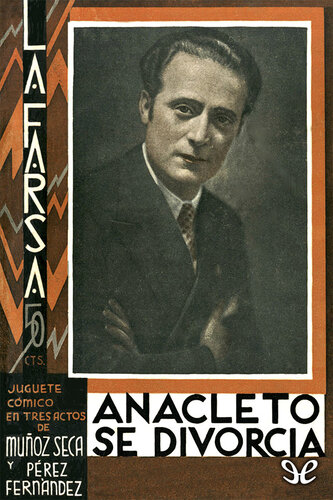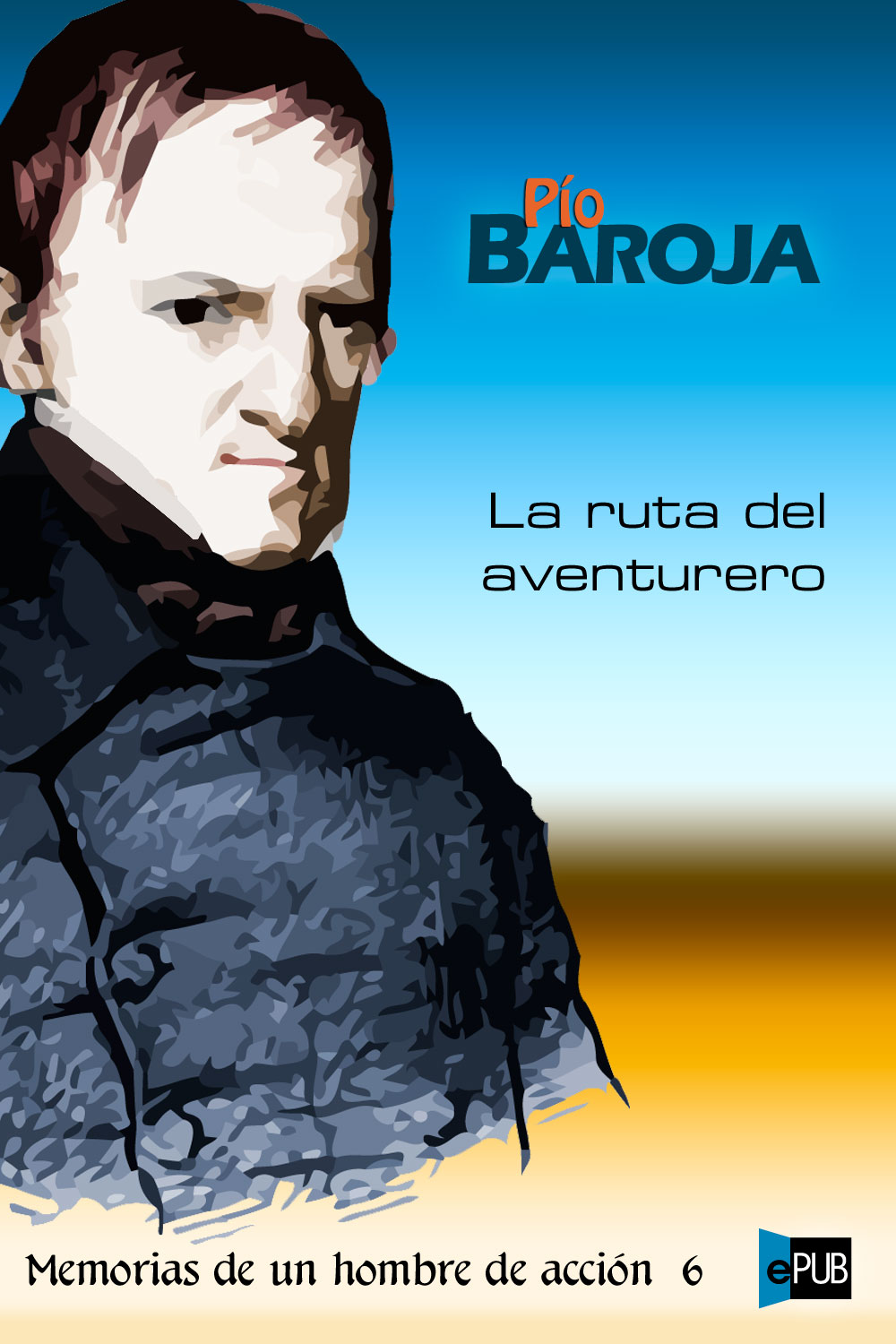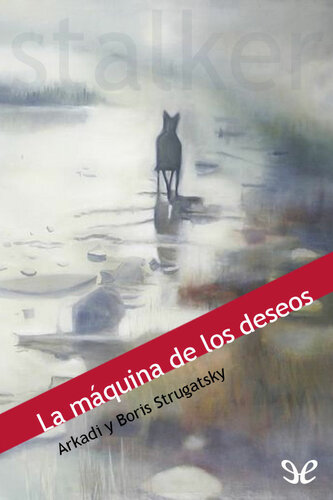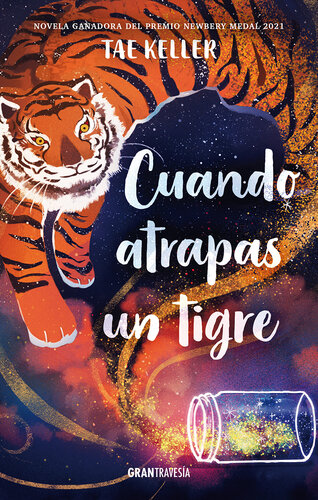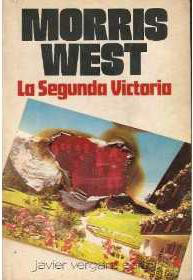oleebook.com
La noche de los tiempos de Molina, Antonio Munoz
de Molina, Antonio Munoz - Género: Ficcion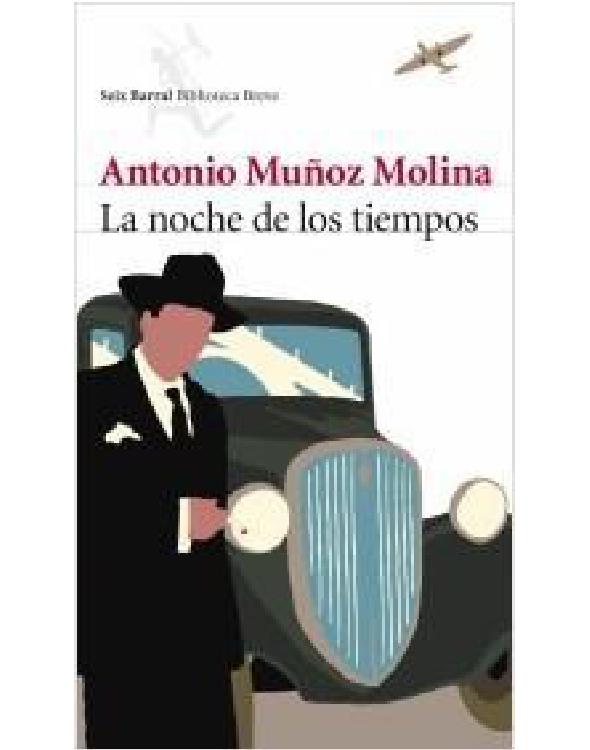
Sinopsis
Un día de finales de octubre de 1936 el arquitecto español Ignacio Abel llega a la estación de Pennsylvania, última etapa de un largo viaje desde que escapó de España, vía Francia, dejando atrás a su esposa e hijos, incomunicados tras uno de los múltiples frentes de un país ya quebrado por la guerra. Durante el viaje recuerda la historia de amor clandestino con la mujer de su vida y la crispación social y el desconcierto previo que precedieron al estallido del conflicto fraticida.
Libros Recomendados - Relacionados
Reseñas Varias sobre este libro
Terminada la novela y, a pesar de su extensión, quedo con ganas de más.
Y no es porque en sus páginas encontremos grandes hazañas (el único Azaña no sale muy grande) o a grandes personajes, al contrario. Tampoco es porque lo que cuenta sea novedoso, todo suena muy conocido, muchas veces leído: el artista malogrado y rencoroso, la familia devota, la americana culta, judía y romántica, el bruto falangista, el sencillo obrero socialista, el fanático comunista o el sabio emigrado y maltratado por la vida.
Pero, paradójicamente, esta falta de novedad, de sorpresa en los hechos y personajes hace que resalte aún más la maravillosa forma de narrar del autor, esa espiral en la que la zanahoria de la expectativa de unos hechos se sacrifica por el amor al detalle minucioso, al retrato psicológico e ideológico de unos personajes y de una sociedad, ambos llenos de contradicciones y claroscuros. Unos retratos que se van formando por acumulación de miradas, de unos y de otros, sin víctimas ni verdugos, o, mejor aún, personajes que encarnan las dos visiones y que van acumulando capas sucesivas a la misma escena, añadiendo matices hasta conseguir el color perseguido.
Es una novela sobre perdedores nada inocentes y sí muy ciegos, encarnados en el personaje que hace de hilo conductor de toda la narración, Ignacio Abel. En el protagonista se conjuga la generosidad social, no exenta de cierto arribismo, con el egoísmo y la ceguera en lo personal, y va a asistir al desmoronamiento tanto de su vida personal como de esa visión histórica del progreso que por fin acabaría con la pobreza y el atraso de la España de principios de siglo.
Es un libro creado desde la memoria y la imaginación que representando la situación de la España prebélica (o esa que el narrador-autor ha imaginado) nos retrata a todos nosotros en aras de una memoria histórica necesaria.135 s4 comments Maria Roxana566
Greu de g?sit cuvintele pentru a descrie aceast? scriitur?...O capodoper? de respira?ie epic?.24 s Alex493 112
This book doesnt deserve a star, it deserve to be presented as an example - this is the way NOT to write.
I wouldnt know where to start. Lets just say, i read carefully for about 40% of the book, then just clicked the pages, read the dialogues (you have the dialogue, 5 pages of nothing or stuff which was already mentioned before 3 times, then again the continuation of the dialogue for 5 lines, then 6 pages of nothing).
- slow tempo. Bad love story. even Danielle Steel or Jackie Collins would come with something better
- Prof.Rossmann dies - not a spoiler. This will be presented and discused many times along the way.
- there is so much historical stuff to be presented and this repeats itself so many times, it doesnt produce any emotion. only anger. The death and death people are very realistic presented, still in such an abundance and with so much details, it creates no emotion. Sometimes is just horror picture show.
- the main character has a big midlifecrisis and i was sorry for his wife.
- if you 4 pages long descriptions of arhitectural stuff this is the book for you.
SPOILER AHEAD -
What kind of idiot leaves his wife and 2 children in times of war to persue his midlife crisis love for a woman 20 years younger? A selfish idiot.
SPOILER ENDED
- love story in the times of the second spanish republic could have worked. but not in this novel.
- if you pointless writing, this is the book for you !
20 s Anthems212 95
"La Noche de los Tiempos" es, sin duda alguna, uno de los principales y más ambiciosos empeños literarios de Antonio Muñoz Molina. El libro es un ejercicio portentoso de narrativa, paradigma de esa literatura-chorro (Chirbes, Javier Marías...), desprovista de diálogos, absolutamente incontenible e incontestable, un sólido muro de palabras deliciosamente construido.
Más allá de su impecable y deslumbrante manufactura, la obra se desarrolla en un contexto manoseado hasta la náusea (otra vez la Guerra Civil, sí), abordando otro de los asuntos más frecuentados por la literatura: la historia de amor tormentosa, moralmente execrable, religiosamente proscrita, de las que nos consumen y nos trastornan, y que sirve como máquina del tiempo para trasladarnos, con sumo realismo, a un Madrid tristemente fanatizado y belicoso. Un Madrid que encarna y capitaliza el desgarro que sufriría todo un país, toda una sociedad. Como es habitual, éste tipo de lecturas nos ofrecen, además, reflexiones sobre la vida, el matrimonio, las expectativas, las decepciones, desnudando el tortuoso flagelo que en innumerables ocasiones es la existencia humana.
Personajes aceptables, lejos de ser memorables; una historia sugestiva y estimulante, aunque innecesariamente extensa. Al fin y al cabo, hay, desde mi perspectiva, un exceso de introspección, de monólogo interno, con una escasez de diálogo y dinamismo notable, que en ocasiones lastra la lectura y el avance de la trama. Está lejos de ser una novela sin mácula, pero sin duda es un esfuerzo literario tremendo y una auténtico derroche de maestría, cuestión que valoro. Libro para gente que disfruta, simplemente (aunque no tan simple), del hecho de leer y releer pasajes bien escritos, esmerados.
Probablemente aburra a la gente que espere acción, giros de guion o una historia que atrape de principio a fin. Es un libro que a todas luces hay que saber escoger como lector. La valoración oscila entre las 4,25-4,5 estrellas.13 s Roger Brunyate946 675
A Solid Novel About a Tottering Time
I have read enough of this massive novel by Antonio Muñoz Molina to speak with some confidence about its quality, but not enough for my review to be considered in any way definitive. Most of its 640 pages are filled with solid blocks of description and memory, with very little action and next to no dialogue. Everything that Muñoz Molina writes has the ring of truth, narrated with meticulous observation. But the texture is simply too dense and the movement too slow to maintain my interest. A problem for me, however, may not be one for other readers.
The date is October 1936. Ignacio Abel, a Spanish architect of some renown (trained partially at the Bauhaus in Germany), is in Penn Station on his way to an appointment at a private college on the banks of the Hudson. He is not a usual Visiting Professor, however, because it is clear that he has fled his country at the outbreak of the Spanish Civil War, virtually penniless, leaving behind his estranged wife and small children, and uncertain of the survival of his American lover Judith Biely. The larger part of the novel takes place during his two-hour train ride, as he casts his mind back to the events of the previous eighteen months: his work on Madrid's University City (a grand project of the short-lived Second Spanish republic), his relationship with colleagues in the various arts (including some real figures passing by on the fringes), and the encounter with Judith which changed his life.
I read about half the book carefully, then skimmed ahead. There is certainly a story here, both on the personal and the historical level, but you have to have a real appetite for detail and analysis to enjoy it. Had I felt much of the frisson of Ignacio's rebirth as a lover, or even had a greater sense of his qualities as an architect, I might have had a greater tolerance for the verbiage. But I gave it 300 pages to hook me in; if I can swim away without a qualm after all that, then so be it.11 s Keith540 66
Antonio Munoz Molina's In the Night of Time is the story of a love affair between a successful, married, middle-aged Spanish architect and a young, beautiful, intelligent American woman. The affair is intense, passionate and destructive. It is an astonishingly gripping tale with a nervous intensity that propels the two characters into situations they did not expect. The book is exceedingly well written, obvious even in translation, and intricately plotted. Molina is a stylist par excellence. He employs different narrative viewpoints, often using a future tense interspersed with present tense. For example, this: Hell be afraid that Judith has left while he slept and hell listen, the silence of the house increasing his alarm. . . . Hell get out of bed and go to the window, afraid Judiths car wont be in front of the house. On the fogged glass, isolated drops trace twisting paths. But hell confirm that the car is still there, black and compact, shiny in the rain. Occasionally, the author intrudes into the story, emphasizing the strange, almost surreal everydayness of the past:
At the open balconies you can see the lighted interiors of houses, family conversations and the clink of dishes blending with music from the radios: the broadcast of a concert by the Municipal Band of Madrid, conducted by Maestro Sorozábal. A bewildered imagination allies itself with knowledge of those mundane details and for a few seconds, a hallucination, a night in July, a night seventy-three years ago, falls before ones eyes.
All of these observations and digressions are melded into a vivid back and forth in time that, despite it's recurring complications, never confuses the attentive reader.
The love affair between Ignacio Abel and Judith Bieley is the fulcrum on which the story rests but the novel is much more than the affair. The two lovers meet in Madrid in September 1935. It is the. last moments of peace before the full fury of a brutal and protracted civil war consumes both Madrid and Spain. The novel's action takes place over thirteen months from September 1935 to October 1936. Molina is very precise about these dates. As the lovers pursue their passions, Madrid descends into a frenzy of competing ideologies; anarchists, communists, socialists and more. In southern Spain General Franco is leading his rebel troops northward towards Madrid. As Franco's armies butcher their way north, the various factions in the city carry out a bloodletting revenge on their enemies both real and imagined.
Molina's title, In the Night of Time reflects the searing, inescapable focus of the novel, the evanescence of time, the disappearance of time. The lovers struggle with the short time they have together, they grasp at their time as it rushes by. Consider this paragraph from the book. It dramatically points out the slippage of time as well as demonstrating Molina's style, the paragraph is just one short and then one very long sentence:
It wasnt the same as saying tiempo de sobra: no matter how much time they had, it would never be more than enough, not even by a minute, and in any case those words didnt express the physical sensation of an undeserved abundance that fills your hands, the coins or diamonds of a fairy-tale treasure, tiempo a manos llenas. Hands full of time, but no matter how tightly you squeeze your fingers and press together your hands curved a bowl, water will always escape, time trickling away second by second tiny grains of sand, gleaming crystals in the morning light on the beach they walked together, not seeing anyone for its entire length, sole survivors of a cataclysm that had left them alone in the world, fugitives from everything, from their lives and the names that identified them with those lives, renegades from any tie or loyaltyparents, children, spouses, friends, obligations, principlesother than the ones that joined the two of them, apostates from any belief.
And the time that is running out for the lovers is also time that is running out for Madrid and, eventually, all of Spain. A brilliant novel.2014 5-star-reading fiction ...more10 s Washington Post199 22.6k
The logic is obvious, hardly fresh ground for a story. Since time immemorial from Homer to Hemingway writers have conjured forbidden love in faraway fields of war. What distinguishes In the Night of Time what makes it eye-openingly new is its meticulous reconstruction of Spain in 1936, its attention to detail, its fusion of history and imagination, its tension between loves surrender and wars stiff resolve. Let me put it this way: Antonio Muñoz Molinas novel is one of the most eloquent monuments to the Spanish Civil War ever to be raised in fiction.
Marie Arana reviewed it for us: http://www.washingtonpost.com/enterta...10 s Carmen Daza Márquez146 14
Lo que diferencia una novela buena de una novela genial, es que las novelas geniales, las que hacen época, son un mundo en sí mismas. Obras como "La Regenta", "Cien años de soledad", "La casa verde" esconden entre sus páginas un mundo propio, único, basado o no en la realidad que da igual: abrir sus p??ginas es parar el reloj de tu vida para sumergirte en la vida de Ana Orozco, Aureliano Buendía o el sargento Lituma, quienes a partir de entonces son seres con una identidad tan real como las personas de carne y hueso con las que te encuentras a diario.
En La noche de los tiempos, Antonio Muñoz Molina ha logrado crear eso que hacía tanto tiempo que no se creaba en España: una novela total, con un espacio, un tiempo y un mundo propios. Una novela histórica que al mismo tiempo no lo es, porque es sobre todo el espacio donde habitan Ignacio Abel y Judith Biely. MM ha escrito su novela de manera minuciosoa, casi artesanal, no descuidando ningún detalle del relato. Una novela de casi mil páginas donde no falta ni sobra ninguna palabra, con una estructura narrativa tan compleja, elaborada y cuidada como la de un relato corto. El autor se ha tomado su tiempo y su trabajo a la hora de construir la novela, y eso lo agradece el lector: todo el esfuerzo de construcción novelísitica ya lo ha llevado a cabo el autor, el lector lo único que tiene que hacer es sentarse cómodamente y disfrutar de la lectura.
No es una novela clásica. La historia se va contando en un vaivén de ida y vuelta, el autor se manifiesta en primera persona al principio de la novela, imaginando a su protagonista en una estación de Pennsylvania en el otoño de 1936. Y desde ahí, desde ese viaje en tren que Ignacio Abel está a punto de emprender, van surgiendo los recuerdos del último año transcurrido, donde sus experiencias personales se irán mezclando con los hechos históricos en España que le acabaron llevando al destierro. La narración va y viene del pasado al presente, de España a América, con un doble avance en paralelo donde a veces se vuelve al pasado y a veces se adelanta lo que va a ocurrir. Y a veces el mismo autor interviene para dar su comentario sobre lo que confiesa estar imaginando en ese mismo momento. Pero esa elaboración minuciosa de la que hablaba antes hace que estos saltos narrativos no dificulten en absoluto la lectura, el avance es tan lento y tan detallado que el lector nunca corre el riesgo de perderse en la historia. Y mientras tanto vamos conociendo a los personajes en toda su complejidad, las virtudes iniciales después resultan no serlo tanto, y otros defectos encuentran su explícación en las circunstancias vitales en las que se movieron los personajes. Todo el mundo tiene su cara y su cruz, nadie es perfecto o imperfecto, pero todos los personajes acaban resultando entrañables por su propia condición de seres humanos intentando sobrevivir en un mundo que se viene abajo.
En resumen: una novela inmensa, única, extraordinaria.
8 s1 comment Kate155 2
"A love story set against the background of the Spanish Civil War" describes this novel, but does not begin to do it justice. It's about memory, time, exile, obsession and betrayal; it is so beautifully written (and translated) as to be, at times, breathtaking. The author's control of the narrative and his deep feeling for his characters are remarkable: the protagonist is weak and selfish at times, yet I never lost sympathy for him (I lost patience at times, but never sympathy), even though his betrayed wife is one of the most sympathetic characters in the story. I wish my Spanish were good enough to have read it in the original, but Edith Grossman's translation is fantastic.8 s Lisa3,443 452
If anyone is revising 1001 Books You Must Read, In the Night of Time must surely be included in the new edition. It is such a masterpiece, it belongs in any canon, along with the great works of Tolstoy, Austen, Proust, Eliot and James Joyce.
The blurb says that its War and Peace, and at first I thought no, its more Proust. The way that the sinuous sentences trigger memories from sensation; the way that Molines characters thoughts meander through ideas and memory and emotion, revealing the story in slow motion. But Tolstoy, this author tells us that in a war nobody understands anything. If any war exemplified this truth, the Spanish Civil War certainly did so, and I thought I understood that from reading Orwell and Hemingway. But In the Night of Time brings us the story not from the perspective of an idealistic outsider confronted by reality, but from the perspective of an ordinary man surprised by a war that has suddenly erupted in a place and a civilisation that he thought was solid and dependable, his country that frustrated him because it was too conservative and too resistant to change.
To read the rest of my review please visit http://anzlitlovers.com/2015/08/11/in...15review c21st spain ...more6 s Laura190 52
Antonio Muñoz Molina es uno de los pocos autores a los que sigo fielmente, he leído casi todas sus novelas, y cuando elaboré algunos materiales para el curso L204 de la OU, elegí pasajes de Sefarad para hablar de los textos descriptivos. Incluso me gusta su estilo tan parsimonioso, basado en las variaciones y repiticiones, al modo de Philip Roth, el autor al que tanto admira.
Aquí Muñoz Molina nos presenta su "novela de la guerra civil española", contándonos cómo la vivió la "tercera España", aquéllos que no comulgaban ni con unos ni con otros y a los que se acusaba de "tibios" o "escépticos". Andrés Trapiello hablaba de "la tercera España" en su ensayo Las armas y las letras. Creo que Muñoz Molina pretende presentarnos al arquitecto Ignacio Abel como protagonista-representante de ese grupo de españoles que no tenían cabida del todo ni en un bando ni en otro.
Todo esto, claro, daría pie a muchas discusiones. Ignacio Abel es un arquitecto que trabaja en la construcción de la Ciudad Universitaria en Madrid en 1935, y la novela nos cuenta ese año anterior al golpe de estado hasta octubre de 1936, cuando Ignacio se exilia a Estados Unidos al aceptar un contrato para construir una biblioteca universitaria. A lo largo del dificultoso trayecto Ignacio Abel va recordando esos acontecimientos, centrándose sobre todo en su aventura extramatrimonial con Judith Biely, una muchacha norteamericana, y en su experiencia del Madrid del verano del 36.
La novela tiene mil páginas más o menos, y pretende ser uno de esos frisos literarios que presentan la sociedad de un país en un momento histórico central, con multitud de personajes que simbolizan diferentes sectores sociales: Ignacio es el hombre hecho a sí mismo, de orígenes humildes pero muy inteligente; se ve rodeado de familiares de mentalidad muy tradicional y religiosa; de intelectuales o políticos de diversas ideologías; de trabajadores de la construcción, regentadoras de casas de citas, de europeos exiliados... Pero Ignacio Abel es un hombre solitario, de pocos amigos, y por eso los personajes secundarios hacen sólo apariciones superficiales, que mueven a veces la trama, eso sí, como el magnate norteamericano que lo contrata.
Qué poco me ha convencido la historia amorosa. El autor nos repite "ad nauseam" lo muchísimo que se aman y desean Ignacio y Judith, nos cuenta los lugares a los que van y donde tienen largas conversaciones, pero asistimos a muy pocos diálogos de la pareja, y sólo atisbamos su intimidad amorosa. Judith cae por eso en el estereotipo de la extranjera independiente y fascinante, mientras que Ignacio se nos revela como el hombre casado de mediana edad celoso y algo cobarde que echa una canita al aire. Nunca actúa en consecuencia con su amor a Judith, sino que parece dejarse vencer por la inercia a lo largo de todo el relato. Sabemos que Judith es consciente de sus debilidades, y es loable que Muñoz Molina no nos intente vender a ese "representante de la tercera España" más que como un hombre común y corriente, con su talento y sus defectos, como todos nosotros.
Me gustaría saber qué se está diciendo de esta novela en España, donde siempre están tan candentes los temas de esta época. 3 s Michael Berman199 19
One of the most amazing novels I've ever read. I don't have it in me (nor do I think that I really have the skills) to write a review that does justice to the book; I feel that anything I say will sound flat and cliched. That said, this is a story of love, loss and betrayal set as the Spanish Civil War is reaching a crescendo. The story travels back and forth over a period of several months, much of it told internally. We follow Ignacio Abel, architect, father, socialist, refugee, as he reflects on (or more accurately, as an unnamed narrator reflects on what Abel is thinking concerning) his marriage, his children, his lover, the turmoil in his country, his beliefs, his work, his friendships, and his flight. (No, none of those are spoilers.)
This is not a book for the faint of heart -- paragraphs sometimes span 2-3 pages, and it seems that each sentence is packed with feeling and resonance. I was often unable to read more than 10 pages at a time. Given that the book was over 600 pages, it took me quite some time. It was well worth it, though.fiction4 s Amy Henry22 7
I will repeat here what I wrote in an earlier update: "In the Night of Time" is simply one of the most brilliant novels I have ever read. Dense, rich, and beautifully written, it is a wealth of history (the Spanish Civil War) and even more significant, one of the most complex portraits of human nature I've encountered. (And I was an English major who read all the "greats.") Time and again, Molina stunned me with an observation of a character's behavior or habits of thought that I recognized instantly as true and universal but rarely remarked on in literature. Though the book is hung on the skeleton of a wartime romance, it is really about that grand thing, the human condition. What it is to be fallible. What it is to keep going in spite of that. It's not a quick read, but it's a great one.3 s Francisco1,038 122
Acercamiento intimista a la tragedia de la Guerra Civil.
Como en ocasiones anteriores, la excesiva verbosidad y la falta de moderación del autor ahoga una buena historia, haciendo que la lectura se convierta en un esfuerzo, en lugar de enganchar al lector: párrafos interminables, estructura enrevesada con constantes saltos en la línea temporal...
Podría haber sido una gran novela. En otra ocasión será.españoles novela4 s Paul FulcherAuthor 2 books1,453
"He knows now that personal identity is too fragile a tower to stand on its own without witnesses to certify it or glances to acknowledge it. The memories of what matters to him most are as distant as if they belonged to another man. The face in the passport is almost a stranger's; the one he is used to seeing now in the mirror, Judith Biely [his lover] or his children would not recognise. In Madrid he saw the faces of people he thought he knew well transformed overnight into the faces of executioners or prophets or fugitives or cattle brought to the slaughter; faces entirely occupied by mouth shouting in euphoria or panic; faces of the dead barely recognisable, half converted into red pulp by a rifle bullet; waken faces deciding on life and death behind a table lit by a lamp while rapid fingers type lists of names...As he reminisces about the day a little over a year ago when he first saw Judith there's almost no feeling of loss, because what's lost has ceased to exist as completely as the man who might have longed for it. There is instead a scrupulous striving for exactitude, the desire to leave a mark through the effort to imagine a world that's been erased, leaving behind few material traces, so fragile that they too are destined for a swift disappearance. But he isn't satisfied with his attempts to restore that moment to its authenticity, stripping away the additional and superimpositions of memory, the restorer who cleans a fresco with delicate patience to bring back the splendour of the original colours. He wants to relive the steps that led him to that encounter that might not have happened, to reconstruct step by step that entire afternoon, the prelude, the hours that brought him to this point in his life."
In the Night of Time tells an all too-conventional love story but set against the memorably drawn background of Spain during the Civil War in 1936.
The central character, the architect Ignacio Abel, has fled the conflict in Madrid to the safe-haven of America - and also indirectly fled his family (who are on the other side of the conflict both physically and in sympathy) in pursuit of his American lover. The novel re-examines the events, both personal and historical, that have led to this point.
The portrayal of the civil war is all the more memorable for being mostly off-staged, viewed by it's impact on the characters' lives and also focused more on the conflicts, rivalries and terrors on the Republican side rather than the atrocities of the advancing Nationalists.
And the novel is at it's best when it describes how identity and certainties disintegrate so quickly in the face of geo-political forces. Abel encounters Dr Rossman, a renowned architect but who, since they met last, has been expelled from both communist Russia and Nazi Germany:
"But Dr rossman was not an older version of the man Ignacio had met in Weimar in 1923 or to whom he'd said goodbye one day in September 1929 in Barcelona...less than six years later in April or May of 1935, he was another man, not changed or aged but transfigured, his skin pale as if his blood had been diluted or extracted, his eyes slightly cloudy water, his gestures frail and his voice as faint as a convalescent, his suits as worn as if he hadn't taken it off, even to go to sleep, since leaving Barcelona in 1929."
But as Rossman points out, as the civil war begins to take hold, is Abel so different:
You Spaniards think that things are solid, that what has endured until now will last forever...You think theres still time, dont try to fool me, you hear what I say and think Im exaggerating or beginning to lose my mind. You feel safe because youre in your city and your country and at heart you think that I and others me belong to another species, another race. But times running out my friend, it slips away from us more and more quickly."
And towards the novel's end, Abel finds himself at a dinner at a private college in the US and has similar thoughts about the President and US society generally:
"He think's he's immortal, Abel thought...he thinks he'll never grow old, that no misfortune will ever befall him, that his house will never be burned, that we won't be awakened at midnight and taken away in his pyjamas to an empty lot and killed in front of headlights"
Molina also touches on the wider situation in Europe as extremism takes a grip, including this memorable vignette on the rising numbers of stateless people:
"Intensely singular and at the same time resembling the others; those who'd left their countries long before and those who had no country to go back to, the stateless carrying Nansen passports from the League of Nations, not allowed to stay in France, but also not admitted to any other country: German Jews, Romanians, Hungarians, Italian anti-fascists, Russians languidly resigned to exileor furiously arguing about their increasingly phantasmagorical country, each with his own language and his own particular manner of speaking bad French, all united by an identical air of their foreignness, documents that didn't guarantee much and bureuacratic decisions always delayed"
Molina effectively links Abel's thoughts on architecture to his views on life - both societal and personal. The novel is strong on Abel's relationship with his wife's family: he married an older woman from a prestiguous family, in part (at least with hindsight) to advance his career, and looking back on his life he realises it "had flattened as it became more solid, stripped of risk and also of surpirse, a project that acquires a firm, useful prescence when it materialises and at the same time loses the originality and beauty that were powerful possibilities at the start, when it was no more than a sketch, a play of lines in a notebook."
On his relationships with his adopted family by marriage (his own parents are both dead):
"They were magnanimous enough to accept him as one of their own; they'd presented him with the most distinguished (though somewhat frayed) daughter of their irreproachable family and facilitated his access to the first rungs of a profession to which he otherwise could not have aspired no matter how many academic honours and diplomas in architecture he might have. They expected him to fulfil his responsibilities, to pay in regular instalments and for the rest of his life the formidable interest on his debt: dignified behaviour, observable conjugal ardor, rapid fatherhood...for years he performed the role so literally and with no detectable effort that he almost forgot another life might have been possible."
And Molina uses an interesting narrative device of an an accusatory letter from Abel's wife interwoven in very brief snatches through the text. "In reality this written voice is the only one that has addressed him since he began his journey, the irate, accusing voice, no longer hurt, only filled with rage, a rage chilled by distance and the act of writing and perhaps, too, by the awareness that the addressee might never receive the letter."
Overall I had mixed feelings with the novel. Molina's isn't fond of the pithy one-liner when 5 pages would otherwise do (the Blaise Pascal quote leaps to mind https://www.goodreads.com/quotes/2122...). The novel is deliberately slowed-down, reflective and re-examining events in forensic detail but, much as I hate to use the word in a review of a literary novel, the effect at times is tedious: tellingly I was relieved rather than left wanting more when the novel finished.
The narrative voice is also a slightly odd choice - it is narrated by an explicit third person observer, Molina himself, not by Abel, as if somehow watching the people and events from outside, indeed the book opens "I see him first at a distance in the rush-hour crowd". But Molina is inconsistent as to whether he is onmiescient or limited in his insights: often he allows himself to drop into the thoughts not only of Abel but of other characters (some real historical figures) and yet he also comments: "I want to imagine, with the precision of lived experience, what happened twenty years before I was born...to do this I'd need to be innocent of the future, ignorant of what is imminent in the present." (Molina himself was born in 1956)
And by far the weakest aspect of the novel is the focus on the affair between Abel and his American lover - there is nothing new or distinctive. His lover comments on page 350 that she had been "childishly imagining she was experiencing a novel-worthy love"; the reader's problem is that the previous 350 pages, and much of the next 250, require us to read that novel.
20153 s Belen156 11 Read
Bueno. .Bueno
Podría decir que es la mejor novela que he leído en mi vida pero no la recomendaría a nadie. ¿Por qué esa extraña contradición?
difícil cuestión es. (Entrando en modo Yoda)
Porque no creo jamás haberleido una novela que reflera tanto mi pensamiento. Sobre todo mi pensamiento pesimista pero sincero interior como lo que he leído en esta.
Claro que eso no significaría que tuviera que ser buena novela. Podría ocurrir que una novela rosa a alguien le parezca que revela sus más intimos pensamientos y eso no sería garantía de su calidad.
Hummmmmm. La novela es muy buena. A base de descripciones de situaciones, de encuentros, de pensamientos interiores de ir hacia atrás y adelante sin adjetivar, solo contando, no convenciendo, solo dando hechos, realidades, sensacions miradas pues te cuenta la historia de un amor entre dos personas un español y una norteamircana con sus circuanstancias y características justo en los días previos y primeros días de la Guerra Civil Española.
¿qué dfine los pensamientos de esta novela? Para mí ñay cientos pero uno que dstaca por su clarividencia por encima de todos. Hay un moemento que el protagonista, por decirlo de alguna manera porque el protagonista aquí para mí es el narrador, admite ante su amada, Amada en el sentido de esa persona que te vuelve del revés y con la que verdaderamente puedes conversar y contarle todo y sacarte de la últimacapa de tu soledad. Pues eso, que ya me perdí, hay un momento que Ignacio Abel, creo que se llama así), dice que El Sentido Común es la mayor de la utopías. Mucho más que aquellos comunistas, anarquistas, socialistas, fascistas, falangistas o iluminados que creían realmente yde corazón en que algún día podrían traer el paraíso a la tierra.
Supongo que es un pensamiento que no se puede tener de joven.
Eso siempre me lleva a preguntarme si habrá llegado mi momento para leer el Quijote.
¿Por qué entonces si la encuentro tan clarividente no la recomendaría?
Porque es larguísima. Ahí reside su complejidad. En serio, no es realmente difícil por el estilo aunque tampoco es sencialla pero tanta longitudo y monumentalidad hace que pueda ser difiícil de llevar.
Aunque no le quitaría ni una página. Nada. Ninguna.
Una gozada. Tengo que seguir leyendo a Muñoz Molina que siempre me gustó pero al que tenía muy abandonado.
B3 s Liviu2,323 654
This is a provisional review as I have finished the Spanish language edition and this is a novel that frankly is more sophisticated than my Spanish abilities, so i really need to read the English translation later in the year when it will be published for a full picture and assessment
What I can say though is the following - extraordinary narrative power but the content did not fully satisfy me as it veers way too much into the over-intellectualizing of romantic angst and the book spends tons of pages on those kind of musings that while well done, seem a bit too contemporary academic-ivory-tower than 1936-ish; now it can be argued that such were a kind of flight from external madness into the inner life, so will see once I get and read the translation.
Finished the English language translation and I finally could appreciate fully this awesome book as my Spanish skills indeed could not allow me to fully enjoy it as I did generally straightforward narrative CR Zafon or S. Posteguillo
A fresco of Spain just before the terrible civil war - despite the blurb, most of the book takes place in 1935- July 1936 (the war starts on July 17) - with echoes from the past and hints about why the tragedy happened and a love story that consumes successful architect Ignacio Abel and the independent left wing American (born in Brooklyn of Russian Jewish origins) Judith Biely
But also a portrait of exile, dispossession, terror and the loss of certainties and solidity and a pitiless world where the innocent is prey, the arrogant, fatuous and well connected rule and the naive are cannon fodder, at first figuratively and later literally
The novel is also a family tragedy and a morality play as Ignacio who owes so much to Adela, his older wife who worships him and to her snobbish but well meaning parents, who again admire and respect him despite his humble origins and who gave him all the advantages and the prestige he needed to succeed and fulfill his talents which otherwise his birth would have denied him, is not fulfilled in his marital life and cannot help himself falling for Judith, while feeling guilty toward his two children and Adela, but somehow rationalizing all away and compartmentalizing his life in two separate parts, until of course they inevitably touch...
Excellent stuff though a book that needs time and attention as the style is the usual modern one, jumping freely between times, tenses and places2013_release_read mainstream read_2013 ...more2 s Ben1,005 22
As his weary eyes scanned the Garamond font ink-stamped characters on the crisp white pages, Ben Frey emitted a barely audible puff of air signifying ennui, exhaustion, and a nagging sense that perhaps he had invested far too much time allotted to his short dreary existence on this planet toward plodding through a lugubrious, verbose, overstuffed volume of metaphysical manifestations of angst and lost love set in the brink of the Spanish Civil War and written by an unmistakably Spanish author with a gift for using two-page-long run-on sentences to express a concept that an American writer could gamely sum up in ten words; but of course, while such a book would be half the length of this book and much easier for readers to enjoy, such enjoyment would be inconsistent with the pain and Hamlet- indecisiveness felt by Ignacio Abel as he watches his world crumble around him and his mistress Judith Biely struggle with whether to leave him and his beloved Spain. Ben's eyelids drooped with the weight of a thousand prosaic unnecessary literary asides cascading down on them, urging them to close and embrace the darkness of nothingness. No, he resisted, perhaps futilely, much as the anti-Franco forces refused to submit to totalitarianism.
As Ben's trembling fingers turned the page to 330, he realized that absolutely nothing of consequence had happened in the novel up to that point. But then, a glimmer of hope. Something resembling a plot point forms, and over the course of another 300 pages, a couple others join their lonely comrade. Modern Spanish fiction is a difficult journey without much reward, but at that point the book became a leviathan, a juggernaut of paper that Ben felt drawn to finish. And finally, with a glassy eyed thousand yard stare, Ben turned to page 659, and with that the book drew to its conclusion. Perhaps life is too short to read unrewarding novels. Perhaps, to the contrary, life is too short to read fluff. Or perhaps a true literary time-suck can only be found on one special evening, in the night of time.2 s Jack9
This is one of the 4 or 5 books I've read that completely immerses the reader in another time and place. you arrive at your subway stop, look up, and think oh I'm not in 1930s Spain, I'm here. But for a brief period, you were there. It's also one of those rare books that make you ache when you finish, because you know it will be years before you find another one this good.
The book moves around in time and place highly effectively, in a way that is magical when done right. You move from the Hudson Valley, to Spain, from 1936 to 1934, etc., back and forth in time, never losing track of where you are and why, happy to be led where Munoz Molina wants you to go.
For what it's worth, it reminds me, both in ability to transport, and in effective skipping around in time and place, of Absalom Absalom, and 100 Years of Solitude. It is in that league, and if you d either of them, you'll probably this.
Faulkner or Proust, Munoz Molina has the ability to write in a way the human brain thinks. you pick up an object and it reminds you of something a friend told you 15 years ago, and then you think of where you were when he told you that, and so on, and so on. He puts you in the mind of his characters as they do this, never losing you, always taking you to where they are. and does so with a spellbinding use of sensual and rich language.2 s Mommalibrarian778 58
I picked this book up on recommendation that it was a good companion to Orwell's Homage to Catalonia. This is a 641 page whopper. It did contain some good, nuanced information on the experience of Madrid before and during the Spanish Civil War. If that is what you are reading the book for you will have to be very patient because it is only included from 1/3 to 1/2 the way through forward. The majority of the novel is the story of a married architect, Ignacio Abel, and his obsession with a young single American tourist. This love story is very intensely and repetitively told beginning with Abel's trip to America and filled out with flashbacks from his point of view and occasionally that of others. This book left me wanting to know more about the history of Spain, how it could descend into such chaos, and by inference how this might happen elsewhere. Many of us are fascinated by tales of pursuing a utopia and finding a dystopia. This one did not just spring from some writer's imagination - it was real. Many of the characters mentioned in this historical fiction were real people and I am as confident of the author's depiction of the historical matter as I would be of a non-fiction history book.dystopia historical-fiction wwii2 s Lisa50 5
What an astonishing book. The structure, the prose style, and especially the setting and characters are created with impeccable skill. I am completely swept up, and now I've paused at a suspenseful moment on page 625 with only a few more pages until the end, in order not to have to part with it quite yet. Molina's novel unfolds an origami ball, with many different entry points, moving forward and back over time, repeating scenes with new layers revealed, growing ever closer to the central meaning of the story and its resolution as you lift each small flap to approach its Truths (Love, and authenticity).
Reading about the Spanish architect protagonist Ignacio Abel, his marriage, his great love, his flaws, and his family, foes, friends and colleagues tied up in the violent events of the Spanish Civil War is fascinating and moving -- and getting to the heart of the novel is a rich reward for the patience it sometimes takes to read Molina's pages-long paragraphs attentively. Molina explores the meaning and mysteries of love and war, family and solitude. It's a deeply humane book. I love and admire it very much.best-reads-of-2014 reviewed2 s Tuck2,245 234
Molina has written a masterpiece novel of span civil war time leading from the dictatorships, and into wwii and the new span dictatorship of good ol franco. This story starts out with span architect in nyc, meeting his lover, but he lets us know matter of factly that he is also married. So from the beginner the reader is wrong footed with moral questions, then on it goes with 600+ pages of moral ambiguity, sketchy narrators and motivations. Super loooong paragraphs (some pages and pages, reviewers have compared them to walls, and they sort of are, and makes me wonder if that is very intentional on author's part, not sure), with dialog interspersed keeps readers going and not succumbing to para-exhaustion . funny that Houghton Mifflin Harcourt published this and not other press or fsg . but good job hmh, do this more often.
Edith grossman translate this and she should get all the prizes too. incredible reading, if a fairly massive reader-endeavor.
basque books-about-books chechnya-russia-ussr ...more2 s Riet1,172
Een boek met een bijna Bijbelse naam van ook Bijbelse afmetingen. Maar boeiend tot aan het eind. Het is het verhaal van een liefdesgeschiedenis tegen het decor van de - beginnende - Spaanse Burgeroorlog. De ongewone benadering van het verhaal, de hoofdpersonen herinneren zich de gebeurtenissen op het tijdstip, dat alles bijna voorbij is, werkt heel goed, maar vergt wel de nodige oplettendheid, omdat het verhaal regelmatig in de tijd verspringt.
Wat mij vooral opviel in dit boek is het feit, dat de Spaanse Burgeroorlog nu eens niet geramantiseerd of geidealiseerd wordt. Het was zoals in dit boek: een bijzonder wrede, gruwelijke afslachting van mensen vanwege hun geloof, politieke overtuiging, beroep, positie of soms zomaar, omdat ze op de verkeerde plek waren. Zeer aan te bevelen!2 s ElenLee139 3
Me vi leyendo y leyendo La noche de los tiempos y hasta la página 500 no logré engancharme a la historia. Una novela ambientada en los meses previos a la guerra civil española que recrea al detalle y con datos rigurosos el ambiente enrarecido de la ciudad de Madrid de entonces. Los personajes, en especial el protagonista, no despiertan simpatía y en ocasiones algunos pasajes se vuelven repetitivos, como si ya los hubieras leídos en páginas anteriores. Aun así, la rica prosa de Muñoz Molina (con escasísimos diálogos) se merecería casi las cinco estrellas. Lástima que la historia no.2 s Robert WechslerAuthor 12 books130 Shelved as 'tasted'
Theres a lot good about this novel. Grossmans translation of Muñoz Molinas often very long sentences is excellent. I loved the authors emphasis on description and storytelling over dialogue, and the odd omniscient narrator (although not so much the movement between present and past tenses). However, I found this novel far too wordy (to the point of skimming parts of it), the central love affair annoyingly overblown and, after reading about 20% of it, I decided that it was not worth the investment of time such a long novel requires. Sadly, after loving Sepharad, this is the second Muñoz Molina novel Ive put down (the other is a Fading Shadow).span-lit1 Duncan Prior36
I only wish this review would do this remarkable book justice, that I had the style and perception of Munoz Molina. Sadly I could never get anywhere near. So I just want to express my sense of profound appreciation of this book as best I can.
I bought this book to read while I was in Madrid visiting my daughter as I try to read books set in the place I visit (and ideally by an author from there and in the native language). I knew I wouldn't finish it by the time I left, but I started to wonder if I ever would. It's a hard read with a distinctive style which is initially inaccessible - long sentences, looping narrative, changes in tense and sometimes person.
I am glad I persisted. Really glad.
To get the best of out of the book, I recognised I had to change my reading style - no point trying to get the best out of it reading in bed before going to sleep, especially after a glass or two of Christmas cheer, no point trying to concentrate while having complex music in the background, no point dipping in and out on the Tube. This is a book to savour when fully awake and alert. A book that deserves full concentration and focus, and a preparedness to learn and to ponder.
So what makes it is memorable and impactful?
Firstly the descriptions of Madrid and the events taking place in it. Assisted by the occasional check on google maps on streets and squares, I got a real sense of what those chaotic months in 1935-6 were . This includes the references to the church and religion, the poverty and inequality, the working conditions and social changes; and then the brutal frenzy of bloodshed that started long before the Nationalist uprising in July 1936. Sometimes writers of historical fictions fall over themselves in their eagerness to show their historical research, only to drown out the characterisation, story and most importantly realism. Why realism? Because they miss the point of uncertainty and that there was a multiplicity of trends, ideas and themes. For example bad writers on the 1930s immerse their characters in series of theatre sets of Great Depression, Hitler, Spain, and finally outbreak of War in a deterministic narrative. Only it didn't happen that. More subtle and nuanced writers who had the benefit of living through the 1930s point out the cul-de-sacs, the issues that people got worked up about, which didn't make it to the school text books such as Italy's invasion of Abyssinia and too much attention generally on Mussolini, the goings on in Yugoslavia, instability in France, various old fashioned dictators in Central Europe and so on. Contemporaries just didn't know, were uncertain what would be important in the long-term - just our politicians have been in response to various events and crises. Dance to the Music of Time by Anthony Powell who lived through the period captures this perfectly. Munoz Molina shares this talent, partly because his writing is so precise and so skilful. He also shows the same skill as he guides his character through meetings with workers and senior powerful politicians - both were realistic and convincing - giving the reader a full sense of society.
Secondly the main character - Ignacio Abel. What a brilliant choice making him an modernist architect with a rationalist approach to his work and, by extension, society. I strongly suspect his buildings wouldn't last the test of time and would be labelled as brutalist. The relationship with an academically minded politician, Negrin (more on him later), was crucial to his rise and the satiation of his bottomless ambition. As it was in Britain a decade or so later, and probably in other countries, because the alliance of rationalist architects and politicians together with the 3rd leg of corrupt construction contractors changed for the worse our urban textures. Peter Smithson who was joint-responsible for the Smithdon High School in Hunstanton (worth a visit if you are in the area to see a great example of impractical brutalism) encapsulated the arrogant "we know best" attitude of these guys); he was described as "temper[ing] considerable intellectual arrogance with a streak of dry humour". This could be Abel who was so unemotional (as he himself acknowledged) he could compartmentalise much of his life and could organise his day perfectly, and his various relationships. His long speech at the end of the book is such a great summary of the sense of the man we were getting throughout the previous 600 pages. However he couldn't cope with his sexual feelings; his passion and desire for Judith. Sex, which probably transmogrified into love, was the only feeling he couldn't control or place in the filing cabinet of his mind.
The other main character, Judith Biely, I felt was a smidgeon less well portrayed. But I got a sense of her romanticism, and search for a sense of purpose, belief and just causes. And the strain between the need to move on and seek out new experiences versus the alternate desire for some stability, companionship and romance.
But the best part of the book was the secondary characters. Van Doren perhaps is the weak link; maybe the book needs a "Mr Big" who could pull the necessary strings to move the plot along at key moments just Dr Mangelbrod in the other big European book I have read recently, The Kindly Ones. I didn't find the explanation of his motives particularly convincing. But let's move on. Professor Rossman - brilliant, so sad. His daughter a wonderful replica of Judith. Same for Moreno who was the mirror image of Abel. In fact the early description of him in Chapter 3 was the sign to me that I really should persevere with this book; it will be worth it. And the description of the "real" characters Negrin and the appalling poet-administrator, Alberti. I suspect Munoz did his homework on these guys. Negrin has always been a controversial character - for historians as well as colleagues. Alberti I didn't know.
And the same for those who found themselves on the other side. The tragic wife, Adela, was wonderfully sensitively portrayed and as for her brother ... His two key scenes were perhaps the most memorable for me - both for drama and for what we learnt about Abel. And there's the children and the mother- and father-in-law. Marvellous.
Do you need to know something about Spain in the 1930s to make sense of all this? It helps to know your Calvo-Sotelo from your Gil-Robles and your Negrin from your Largo-Cabellero but not essential. I would say my reading about the 2nd Republic (Preston, Thomas etc) made me agree with the theme expounded by Negrin and later at some length brilliantly by Abel. The reformers were stuck between two sets of extremists who behaved in an idealistic and irresponsible fashion. But perhaps as many historians sympathetic to the 2nd Republic point out, they should have been more cautious and worldly which wasn't commented on in the book.
I certainly will look up the writers that the book introduced to me - Benito Perez Galdos and César Vallejo. So my point is whatever your level of knowledge of Spanish culture and history (and Hispanic) this book has something to offer.
The shifting time part of the book, I can't possibly comment on; other than to say it was a great feature. So skilful to start a little story with the end or an event near the end and gradually go back to the start and to the climax. And to change the voice as though it was a contemporary looking back at the 1930s.
Final point - I suspect this was a great translation by Edith Grossman. I also suspect not an easy book to translate but a job well done.
So take time, get yourself in the mood, and sit back and make an effort to enjoy this classic. It's worth it. Tonymess462 41
Edith Grossman is the translator of Antonio Munoz Molinas In The Night Of Time and its not often that you have the cover spruiking the translator in similar sized font to the author. For this work she would have needed the patience of a saint, this is one serious tome of a novel, besides running to 641 pages it is large in shape, the paragraphs run for pages on end and therefore each page is wall to wall text. So if youre not into a long slow challenge then this is not a novel for you.
Our story starts with an unknown narrator observing Ignacio Abel at Pennsylvania Station in 1936. He is about to board a train to take him to upstate New York where he has been asked to design a new library. The train journey begins and Juan Ignacio drifts back to Spain and the reasons behind his move here. This is the story of the Spanish Civil War:
"Professor Rossman no longer had to wait for anything. Hed been buried with several dozen other corpses and hurriedly covered in lime in a common grave in Madrid, infected without reason or fault by the great medieval plague of Spanish death, spread indiscriminately by the most modern and most primitive means a, everything from Mauser rifles, machine guns, and incendiary bombs to crude ancestral weapons: pocketknives, harquebuses, hunting shotguns, cattle prods, even animal jawbones if necessary, death that descended with the roar of airplane engines and the neighing of mules, with scapulars and crosses and red flags, with rosary prayers and the shouting of anthems on the radio."
This slow train journey takes over 500 pages of the novel and the flashbacks arent primarily about the Civil War, it is a crescendo in the novel becoming increasingly prominent and all consuming. In the early sections we learn about Ignacio Abels training to become an architect, from a working class family, his success, marriage, fatherhood and then his falling in love with an American tourist Judith. The early sections being all consuming with his love affair, with the Civil War as merely a backdrop, a Spain rotten to the core:
For my full review go to http://messybooker.blogspot.com.au/1 Carlos Redondo51 2
La noche de los tiempos es una novela que nos habla del Madrid previo a la Guerra Civil y de los inicios de ??sta. Nos retrata la sociedad existente en esa época, de puños y brazos en alto, de sacristías y rosarios y de monos de trabajo y alpargatas. Nos relata muchas de las barbaridades que en esos días eran cotidianas. Sin embargo creo que Antonio Muñoz Molina nos cuenta, sobre todo, una historia de amor. Una historia clandestina, un adulterio, una "aventura", pero historia de amor al fin y al cabo.
El estilo me ha exigido una máxima concentración en la lectura, especialmente el primer tercio de la novela donde a veces tenía la sensación de ahogarme pero ha merecido la pena continuar leyendo. Una vez que te habitúas a la prosa de Muñoz Molina, a sus constantes saltos en el tiempo y a sus (a veces) repetitivas descripciones obtienes una gran recompensa. Al final ha sido un enorme placer leer La noche de los tiempos.
Monumental novela de Antonio Muñoz Molina.
españa1 Nuria9 4
Bajo esta reflexión sobre la memoria, el pasado y los caminos bien (y mal) tomados, subyace la memoria borrosa y, al mismo tiempo, imborrable de los comienzos de la Guerra Civil española. En su técnica narrativa, la novela de Muñoz Molina se acerca a a Proust y a Henry James, con toques de Ford Maddox Ford e incluso James Joyce en representación del mundo interior de su protagonista ; Clarín y la novela del fin de siglo española se dibujan en la amplitud y profundidad del mundo social asfixiante que retrata el autor. Incluso se notan toques de posmodernismo, momentos en los que el autor/narrador se comunica con el lector, rompiendo por un instante la barrera artificial que separa la realidad de la ficción. Una obra de madurez y una de las pocas novelas "escritas para adultos," como Virginia Woolf describió la obra de George Eliot, "Middlemarch."1 Erika181 9
Autor del comentario:
=================================
